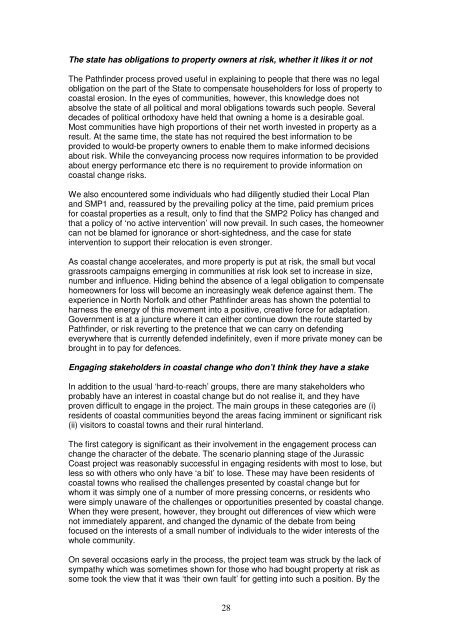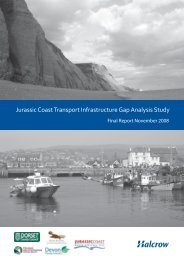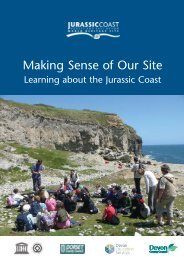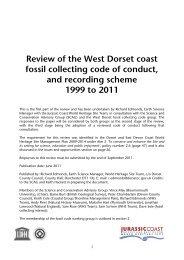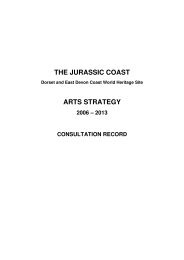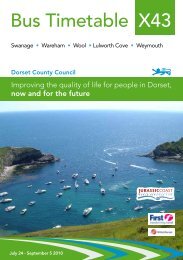Final Report to DEFRA - Jurassic Coast
Final Report to DEFRA - Jurassic Coast
Final Report to DEFRA - Jurassic Coast
Create successful ePaper yourself
Turn your PDF publications into a flip-book with our unique Google optimized e-Paper software.
The state has obligations <strong>to</strong> property owners at risk, whether it likes it or not<br />
The Pathfinder process proved useful in explaining <strong>to</strong> people that there was no legal<br />
obligation on the part of the State <strong>to</strong> compensate householders for loss of property <strong>to</strong><br />
coastal erosion. In the eyes of communities, however, this knowledge does not<br />
absolve the state of all political and moral obligations <strong>to</strong>wards such people. Several<br />
decades of political orthodoxy have held that owning a home is a desirable goal.<br />
Most communities have high proportions of their net worth invested in property as a<br />
result. At the same time, the state has not required the best information <strong>to</strong> be<br />
provided <strong>to</strong> would-be property owners <strong>to</strong> enable them <strong>to</strong> make informed decisions<br />
about risk. While the conveyancing process now requires information <strong>to</strong> be provided<br />
about energy performance etc there is no requirement <strong>to</strong> provide information on<br />
coastal change risks.<br />
We also encountered some individuals who had diligently studied their Local Plan<br />
and SMP1 and, reassured by the prevailing policy at the time, paid premium prices<br />
for coastal properties as a result, only <strong>to</strong> find that the SMP2 Policy has changed and<br />
that a policy of ‘no active intervention’ will now prevail. In such cases, the homeowner<br />
can not be blamed for ignorance or short-sightedness, and the case for state<br />
intervention <strong>to</strong> support their relocation is even stronger.<br />
As coastal change accelerates, and more property is put at risk, the small but vocal<br />
grassroots campaigns emerging in communities at risk look set <strong>to</strong> increase in size,<br />
number and influence. Hiding behind the absence of a legal obligation <strong>to</strong> compensate<br />
homeowners for loss will become an increasingly weak defence against them. The<br />
experience in North Norfolk and other Pathfinder areas has shown the potential <strong>to</strong><br />
harness the energy of this movement in<strong>to</strong> a positive, creative force for adaptation.<br />
Government is at a juncture where it can either continue down the route started by<br />
Pathfinder, or risk reverting <strong>to</strong> the pretence that we can carry on defending<br />
everywhere that is currently defended indefinitely, even if more private money can be<br />
brought in <strong>to</strong> pay for defences.<br />
Engaging stakeholders in coastal change who don’t think they have a stake<br />
In addition <strong>to</strong> the usual ‘hard-<strong>to</strong>-reach’ groups, there are many stakeholders who<br />
probably have an interest in coastal change but do not realise it, and they have<br />
proven difficult <strong>to</strong> engage in the project. The main groups in these categories are (i)<br />
residents of coastal communities beyond the areas facing imminent or significant risk<br />
(ii) visi<strong>to</strong>rs <strong>to</strong> coastal <strong>to</strong>wns and their rural hinterland.<br />
The first category is significant as their involvement in the engagement process can<br />
change the character of the debate. The scenario planning stage of the <strong>Jurassic</strong><br />
<strong>Coast</strong> project was reasonably successful in engaging residents with most <strong>to</strong> lose, but<br />
less so with others who only have ‘a bit’ <strong>to</strong> lose. These may have been residents of<br />
coastal <strong>to</strong>wns who realised the challenges presented by coastal change but for<br />
whom it was simply one of a number of more pressing concerns, or residents who<br />
were simply unaware of the challenges or opportunities presented by coastal change.<br />
When they were present, however, they brought out differences of view which were<br />
not immediately apparent, and changed the dynamic of the debate from being<br />
focused on the interests of a small number of individuals <strong>to</strong> the wider interests of the<br />
whole community.<br />
On several occasions early in the process, the project team was struck by the lack of<br />
sympathy which was sometimes shown for those who had bought property at risk as<br />
some <strong>to</strong>ok the view that it was ‘their own fault’ for getting in<strong>to</strong> such a position. By the<br />
28


